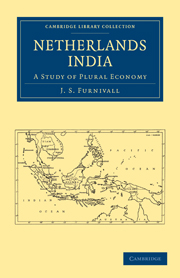Book contents
- Frontmatter
- INTRODUCTION
- Contents
- TERRITORIAL DIVISIONS
- NETHERLANDS INDIA
- AUTHOR'S PREFACE
- LIST OF GENERAL REFERENCES
- GLOSSARY
- MEASURES AND CURRENCY
- THE MALAY ARCHIPELAGO, IN COMPARISON WITH EUROPE
- Chapter I INDONESIA, TO 1600
- Chapter II THE EAST INDIA COMPANY, 1600–1800
- Chapter III THE YEARS OF CONFUSION, 1795–1815
- Chapter IV THE YEARS OF UNCERTAINTY, 1815–1830
- Chapter V THE CULTURE SYSTEM, 1830–1850
- Chapter VI THE TRANSITION TO LIBERALISM, 1850–1870
- Chapter VII LIBERALISM, 1870–190
- Chapter VIII EFFICIENCY, WELFARE AND AUTONOMY
- Chapter IX ADMINISTRATIVE AND POLITICAL REFORMS
- Chapter X ECONOMIC PROGRESS
- Chapter XI SOCIAL ECONOMY
- Chapter XII SOME EFFECTS OF THE CRISIS OF 1929
- Chapter XIII PLURAL ECONOMY
- INDEX OF REFERENCES
- GENERAL INDEX
Chapter XI - SOCIAL ECONOMY
Published online by Cambridge University Press: 07 September 2010
- Frontmatter
- INTRODUCTION
- Contents
- TERRITORIAL DIVISIONS
- NETHERLANDS INDIA
- AUTHOR'S PREFACE
- LIST OF GENERAL REFERENCES
- GLOSSARY
- MEASURES AND CURRENCY
- THE MALAY ARCHIPELAGO, IN COMPARISON WITH EUROPE
- Chapter I INDONESIA, TO 1600
- Chapter II THE EAST INDIA COMPANY, 1600–1800
- Chapter III THE YEARS OF CONFUSION, 1795–1815
- Chapter IV THE YEARS OF UNCERTAINTY, 1815–1830
- Chapter V THE CULTURE SYSTEM, 1830–1850
- Chapter VI THE TRANSITION TO LIBERALISM, 1850–1870
- Chapter VII LIBERALISM, 1870–190
- Chapter VIII EFFICIENCY, WELFARE AND AUTONOMY
- Chapter IX ADMINISTRATIVE AND POLITICAL REFORMS
- Chapter X ECONOMIC PROGRESS
- Chapter XI SOCIAL ECONOMY
- Chapter XII SOME EFFECTS OF THE CRISIS OF 1929
- Chapter XIII PLURAL ECONOMY
- INDEX OF REFERENCES
- GENERAL INDEX
Summary
1. Introduction. The brief survey which we have just attempted of economic progress in Netherlands India during the present century should illustrate, however inadequately, the energy and success with which the Dutch have applied themselves to discharging one part of their task under the “dual mandate” thrown on them by the course of history—their duty to the world in general of developing the natural resources of this region, la richesse naturelle. We must now attempt a more difficult undertaking, a survey of their efforts and achievements in the other part of the dual mandate—their duty to their subjects of developing la richesse humaine, the human wealth of the peoples for whom they have incurred responsibilities.
At the beginning of the century it was expected, or at least hoped, that the Ethical programme would act like a new Culture System, no less effective for the advancement of the people than that of Van den Bosch for the cultivation of the soil. The main objects of the Ethical policy were to stimulate the material welfare of the people, to strengthen the native social order, and to promote the unification of society. These ends became even more directly the objective of the policy of autonomy, and it is the progress which has been achieved under these heads that we must now try to appreciate.
- Type
- Chapter
- Information
- Netherlands IndiaA Study of Plural Economy, pp. 346 - 427Publisher: Cambridge University PressPrint publication year: 2010First published in: 1939
- 1
- Cited by

